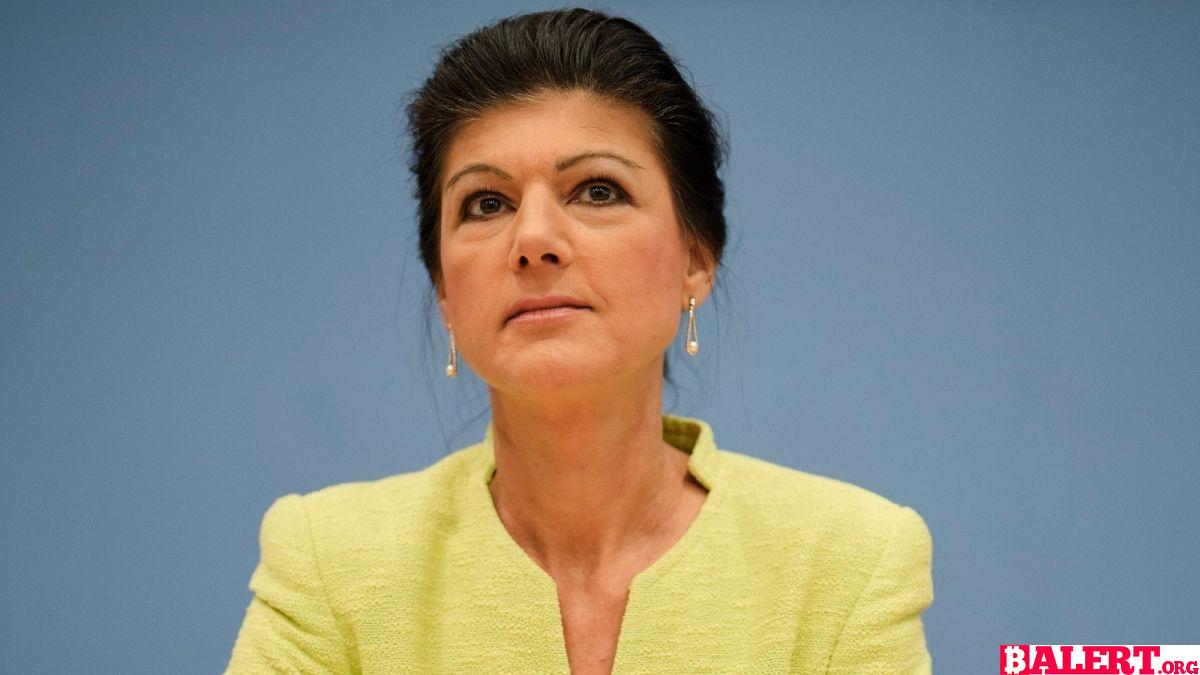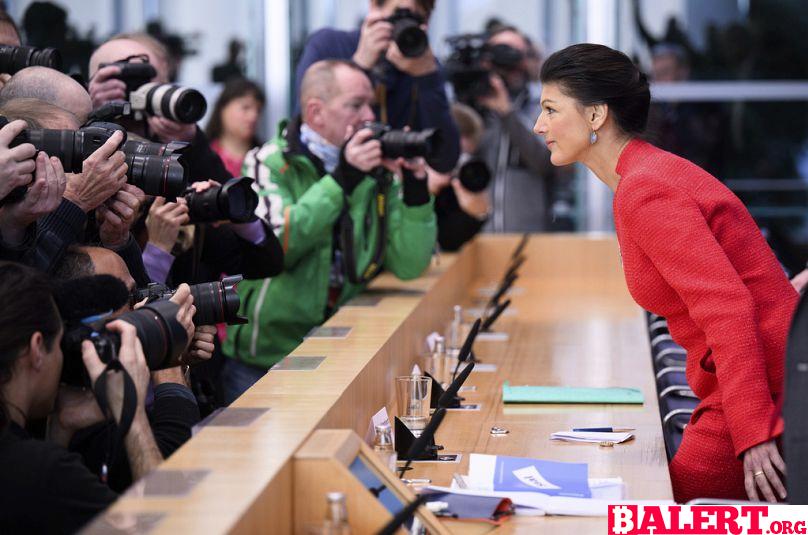World
The Rise of the Sahra Wagenknecht Alliance in German Politics
Explore the emergence of Sahra Wagenknecht’s Alliance in German politics, examining its impact on the political landscape, key ideologies, and the future of leftist movements in Germany.

The recent elections in the German states of Saxony and Thuringia have been a significant setback for the traditional left. However, amidst this turmoil, a relatively new party has emerged with surprising momentum. The Sahra Wagenknecht Alliance (BSW) has notably secured third place in both states, garnering 15.8% of the votes in Thuringia and 11.8% in Saxony. This unexpected success has drawn comparisons not only to the left’s decline but also to the rise of the far-right Alternative for Germany (AfD), especially following their victory in Thuringia.

Hardliner, Populist, or Both?
Sahra Wagenknecht has been a prominent figure on the far-left spectrum of German politics throughout her career. Born in Jena and raised in East Berlin, she became politically active at a young age, joining the Free German Youth and the Socialist Unity Party of Germany before she turned 20. After the reunification of Germany, she pursued higher education in philosophy, earning a master’s degree with a thesis on Karl Marx’s interpretation of Hegel, which was later published as a book in 1997. She further obtained a doctorate in microeconomics of developed countries, all while advancing her political career.
In 2007, as various leftist parties united to form Die Linke, Wagenknecht emerged as one of its most prominent and polarizing figures, ultimately serving as one of its leaders in the Bundestag. However, her relationship with Die Linke soured over time, culminating in a lengthy and contentious divorce from the party. This split was characterized by a significant faction calling for her expulsion. In January, she founded her own political entity, driven by her conviction that traditional left-wing parties have strayed from their core mission of serving the working class, becoming overly lenient on migration issues, and capitulating to environmental demands—stances she ardently opposes.
Cozying Up to the Kremlin?
Wagenknecht’s economic perspective promotes robust social spending, high wages, and state ownership of resources. Nonetheless, her views on domestic and foreign policy starkly contrast with those of the mainstream left in Germany. In 2017, she advocated for the dissolution of NATO and proposed a new security arrangement that would realign Germany closer to Russia, which is a significant supplier of gas to the country. Following Russia’s invasion of Ukraine in February 2022, she opposed sanctions against the Kremlin and rejected the idea of supplying military aid to Ukraine. In early 2023, she initiated a petition aimed at halting arms deliveries to Ukraine, seeking a diplomatic resolution to the ongoing conflict. Her “Manifesto for Peace” garnered approximately 700,000 signatures on Change.org within just a month, reflecting her substantial support base.

Wagenknecht’s position on the Ukraine conflict has found favor among far-right factions, including the AfD, while simultaneously causing embarrassment for her former party, Die Linke, leading to the resignation of two prominent members.
Critique of Merkel’s Migration Policies
Wagenknecht has consistently criticized the migration policies implemented by former German Chancellor Angela Merkel. She argues that local authorities in Germany lack the financial resources and infrastructure to adequately accommodate migrants, a situation she believes fosters social tensions and conflicts. In 2017, she controversially claimed that Merkel’s policies contributed to the tragic Islamist attack on Berlin’s Christmas market in 2016, which claimed the lives of 12 individuals.
- Wagenknecht has called for imposing limits on the number of refugees, a viewpoint that, while contentious, has gained traction among various segments of the German population.
- This position has also been echoed by influential figures, including German President Frank-Walter Steinmeier, in 2023.
To articulate her views on migration, she authored a book titled The Self-Righteous (“Die Selbstgerechten”) in 2021, where she contended that the current migration policies adversely affect the working class. The book achieved remarkable success, reaching the top of the German non-fiction charts and establishing her as one of the highest-earning members of parliament in the country.
World
Dominique Pelicot Testifies in Harrowing Rape Trial
Join us as Dominique Pelicot courageously testifies in a harrowing rape trial, shedding light on the complexities of trauma and justice. Her powerful story raises crucial questions about the legal system and the importance of support for survivors.

Dominique Pelicot Takes the Stand in Shocking Rape Trial
In a courtroom drama that has captivated France and garnered international attention, Dominique Pelicot, the man at the center of a harrowing rape trial, finally addressed the court. With tears streaming down his face, he recounted how his wife had been instrumental in helping him cope with a tumultuous past marked by trauma. He revealed that he had endured a sexual assault at the tender age of nine while hospitalized, and he also witnessed a gang rape during his teenage years while working as an apprentice electrician on a construction site.
“She didn’t deserve this, I acknowledge that,” Mr. Pelicot stated, his voice barely audible as he struggled to convey his emotions. The gravity of the situation weighed heavily on him, and the courtroom fell silent, straining to catch his every word.
Now 71 years old, Mr. Pelicot faces serious allegations of drugging his wife, Gisèle Pelicot, whom he has been married to for half a century, over a span of nearly ten years. Prosecutors contend that he used drugs to render her comatose, allowing him to rape her repeatedly. Furthermore, authorities allege that he went so far as to invite numerous men into their home, facilitating a nightmarish scenario where they, too, engaged in the assault of his wife.
Overall, 51 men, including Mr. Pelicot, are on trial concurrently, primarily facing charges related to the aggravated rape of Ms. Pelicot. Among them, one individual has already pleaded guilty to similar crimes, admitting to drugging his own wife to assault her and inviting Mr. Pelicot to partake in the horrific act while she was incapacitated.
Mr. Pelicot’s unexpected testimony came after a tumultuous start to the trial. Just a week in, he was stricken with severe health issues that forced him to miss four consecutive days in court. The head judge ultimately decided to postpone proceedings, as Mr. Pelicot was diagnosed with kidney stones, a kidney infection, and prostate complications, adding yet another layer of complexity to this already harrowing case.
World
Meta Bans Russian State Media Outlets from Social Media Platforms
Explore the implications of Meta’s decision to ban Russian state media outlets from its social media platforms. Understand the impact on information dissemination and the ongoing battle against misinformation in the digital landscape.

Meta Imposes Global Ban on Russian State Media Outlets
In a significant move, Meta Platforms, Inc., the parent company of Facebook, has announced the prohibition of Russian state media outlets, including RT (Russia Today) and Rossiya Segodnya, from all its social media platforms. The decision stems from the company’s concerns regarding the deceptive strategies employed by these media organizations to execute covert influence operations across the internet.
Meta made this announcement on Monday, emphasizing that the ban will be enforced worldwide across its various platforms, such as Instagram, WhatsApp, and Threads. The rollout of this ban is expected to take place over the coming days.
Statement from Meta
A spokesperson for Meta elaborated on the decision, stating, “After careful consideration, we have expanded our ongoing enforcement actions against Russian state media outlets. As a result, Rossiya Segodnya, RT, and other affiliated entities are now banned from our applications globally due to their involvement in foreign interference activities.”
For further insights into this development, watch the video in the player above.
World
Trump Recalls Alleged Assassination Attempt While Golfing
Explore Donald Trump’s chilling recollection of an alleged assassination attempt he experienced while enjoying a round of golf. Delve into the tense moments and his reflections on safety, fame, and the unpredictability of public life.

In a recent interview on the social media platform X, Republican presidential nominee Donald Trump recounted a harrowing incident he claims to have experienced while playing golf. Trump described how, during a peaceful Sunday morning round with friends, the tranquility of the day was abruptly shattered by the sound of gunfire in the air.
“It was a beautiful day, everything was just perfect,” Trump reflected. “Then all of a sudden, we heard shots being fired—probably around four or five in total.” He went on to explain that a Secret Service agent was the first to spot the suspect, who was allegedly armed with an AK-47, a powerful assault rifle.
“The agent saw the barrel of the weapon and immediately took action, returning fire at the barrel and aiming in the direction of the bushes,” Trump detailed. “I would have loved to have sunk that last putt, but we decided it was best to leave the scene promptly.”
Trump expressed his gratitude towards the agents and a vigilant civilian who aided in tracking down the suspect, who was eventually apprehended following a high-speed chase.
Suspect Faces Multiple Federal Gun Charges
The FBI has identified the suspect as Ryan Wesley Routh, accusing him of targeting Trump during his time at the golf club in West Palm Beach, Florida. According to an FBI report, Routh had allegedly hidden among the hedges of the golf course for an astonishing 12 hours. Authorities discovered an SKS-style assault rifle, a GoPro camera, and a bag of food at the scene.
The 58-year-old Routh is now facing two serious federal gun charges. If convicted on both counts, he could face a combined maximum sentence of 20 years in prison. Notably, neither of the charges is directly related to an assassination attempt. The first charge pertains to possessing a firearm despite a prior felony conviction, which carries a potential 15-year sentence, a fine of $250,000 (€225,000), and three years of supervised release.
The second charge involves possession of a firearm with an obliterated serial number, which could result in a five-year prison term, the same financial penalties, and also three years of supervised release. As the investigation continues, additional charges could be forthcoming.
While the motive behind Routh’s actions remains unclear, his digital footprint reveals strong political affiliations, particularly concerning issues surrounding Ukraine and China. Routh consistently expressed support for Ukraine across various social media platforms, even claiming to have orchestrated a recruitment scheme for international volunteers aiming to assist Ukraine in its fight against Russia’s invasion. This behavior has been denounced by Ukrainian soldiers and members of the International Legion, who disavowed Routh’s actions and motives.
-

 Business5 months ago
Business5 months agoThe Significance of Jackson Hole: A Central Banking Tradition
-

 Tech4 months ago
Tech4 months agoNew Leaks and Features About the Samsung Galaxy S25 Ultra
-

 Business6 months ago
Business6 months agoObituary: Dan Collins
-

 Article7 months ago
Article7 months agoCreative Design Applications Developed with Artificial Intelligence
-

 Business4 months ago
Business4 months agoBhutan’s Strategic Investment in Bitcoin: A New Era for the Himalayan Kingdom
-

 World4 months ago
World4 months agoThierry Breton Resigns: Impact on European Union Leadership
-

 Gaming4 months ago
Gaming4 months agoNew Details and Trailer Released for Dead Rising Deluxe Remaster
-

 Gaming4 months ago
Gaming4 months agoNew Details for Alan Wake 2 and PlayStation 5 Pro Announcement












